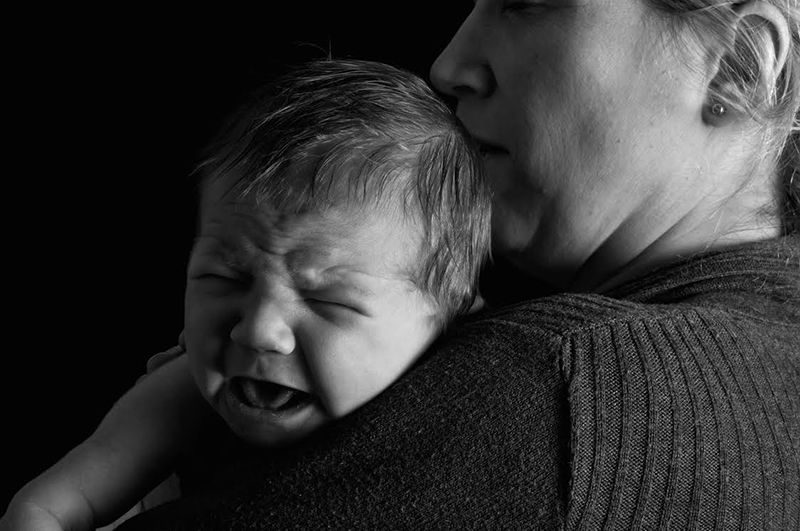As I sat in our La-Z-Boy, rocking my 3-year-old son and his virus for a fourth straight night, I had some serious time to think about the recent interview with author Meghann Foye advocating for “Meternity Leave.”
In a new novel and interview with the New York Post, Foye is promoting the idea that maternity leave is “a sabbatical-like break” deserved by women with babies or without. She envies women who return from maternity leave to make career changes to something more flexible. All of this stems, she proposes, from time off from the workplace “digging into your whole life and emerging from it more confident in who you are.”
I have to laugh. These words are clearly written by someone who has never been on an actual maternity leave. While it would be very satisfying to describe what actually happens with a new baby in the house — why sleeplessness, sore nipples, midnight diaper blowouts, sitz baths and the joys of not showering for five days straight are so very unlike a “sabbatical” — I believe that there are far more serious concerns to address here.
Foye’s advocacy for maternity-like leave as a means to self-actualization trivializes the real and crucial need for actual families to have access to paid maternity leave in order to afford the everyday requirements for living with a new baby in the home — food, rent/mortgage, gas, etc.
The United States ranks with Swaziland and Papau New Guinea as one of the only developed countries in the world without paid maternity leave. With the Family Medical Leave Act (1993), new parents are guaranteed their jobs for 12 weeks, but none of this time is guaranteed paid, making it virtually impossible for many Americans to use this benefit. Only about half of first-time moms in the U.S. are able to take any paid time off after childbirth.
Those of us living in Los Angeles know that most families rely on two incomes; in fact, 55 percent of all families living in the L.A. metro area have incomes below the family budget threshold, meaning they struggle to find money each month for the basic necessities. When one of those incomes ceases for any length of time, families are in crisis.
Just how bad is it? The Federal Reserve Board recently reported on a 2013 study asking families across the U.S. — from every socio-economic category and every type of neighborhood and community — how they would pay for a $400 emergency. Forty-seven percent of respondents said they would be forced to borrow or sell something or would not be able to come up with the money at all.
When families on the economic edge are expecting a new baby, emotions are complicated. Painting the nursery may not be high on the priority list. Figuring out where the money will come from when mom takes off work, how to pay for childcare and what to do when the baby is sick keep expectant parents up at night.
If even one family chose to abort their new little one because they could not answer these questions, it would be one way too many. Yet, sidewalk counselors and pregnancy centers will tell you that so often these are the reasons women head to abortion clinics. Women from our own parishes, some already with children, are choosing abortion because they see no way out of their economic hardships.
The government has only one interest in paid maternity leave — the obligation to care for its tiniest members, those who cannot care or speak for themselves. Every study points to significant improvement in child health when infants have time to bond with their parents. We can look pragmatically at economic factors as well, all of which show that not only do children who spend time bonding with parents grow up healthier and more productive, mothers and fathers in the workplace are more productive and efficient if they are given time to take care of their children at home.
Advocating for paid maternity leave and policies that support parenting and raising healthy families ought to be a priority for people of faith, for people of life.
Perhaps Foye’s endorsement of “Meternity Leave” is meant to be light-hearted, but I see it differently. When we talk about motherhood as one among many choices for self-actualization, we miss the entire point. There is no “me” in maternity leave. Once a woman becomes a mother, she lives for someone other than herself. That doesn’t mean she shouldn’t have time to herself or space to fulfill her own goals. It means that she now does so from a different vantage point — from the perspective of motherhood.
Let us look forward to and pray for a time when our public policy supports parenting and strengthening families, when the responsibilities of mothers and fathers in the home and workplace are valued and rewarded. Let’s work together to get moms and dads the resources they need to parent to the best of their abilities. The world is tough enough. To deny moms and dads the chance to bond with their babies — sleeplessness and diapers included — is a cruelty we can certainly avoid.
To all those moms and moms-to-be, happy (belated) Mother’s Day!

